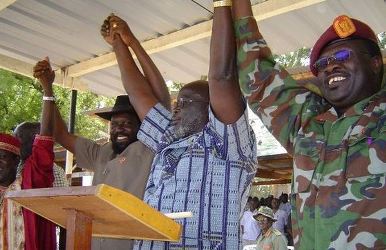Machar calls to prepare ground for national reconciliation and healing
November 29, 2012 (JUBA) – South Sudan’s vice-president, Riek Machar, on Thursday urged the leaderships of the state governments to prepare the ground for the upcoming conference on national reconciliation and healing among the communities and leaders in South Sudan.

The vice-president briefed the state leaders about the initiative by the government to make the nation reconcile with its past, adding that the bitterness should not be allowed to carry on to the next generation.
Machar blamed the situation on the decades of war with the present Sudan and its resulting internal conflicts within South Sudan, saying such conflicts caused mental and physical barriers among the communities.
This, he said, has also affected the inter-marriages between tribes which used to be a practice by the older generation.
Machar recalled a sample research he made during his visits to Lakes state during which nobody from the younger generation including youth in the cattle camps told him he got married to a Nuer girl. Only people from the older generation of the Dinka tribe of about 50 years of age said they got married to Nuer ladies.
When he asked why the youth didn’t get married to Nuer girls, the young men replied that during the war there were no more inter-communal meeting points of youth across the communal borders where young men across could have a chance to court girls from the other side since communities became rivals and enemies, they told Machar.
Machar further recalled that during those good old days a Nuer or Dinka man would fluently speak and even sing songs in the other’s language in the process of courting the girls.
“We need to break this barrier,” Machar told the state leaders.
Leaders in South Sudan are known for their reconciling spirit after political differences. Examples include the reconciliation between Machar and the late leader, John Garang, in 2002 in Nairobi, which resulted to the merger of their forces after the 1991 political split.
Another successful reconciliation was between the late leader John Garang and the current president of South Sudan, Salva Kiir Mayardit, in Rumbek in November 2004, when a conflict emerged between the two over the running of the movement.
Machar told the state leaders that the current barriers caused by the lingering wars in minds even after independence was attained should be addressed and overcome, urging them to prepare the ground for the reconciliation.
The Office of the President through the Presidential advisor for decentralization, Tor Deng Mawien, will organize the upcoming April 2013 conference and its subsequent campaigns in the states. It will also establish the necessary communications with all the stakeholders at all levels of government.
A renowned international organization, the Initiative of Change, which is known for intervening in such reconciliation processes around the world, will also participate in the similar process in South Sudan. The vice-president of the Initiative of Change, Edward Peter, an Australian-born British, was present with his team during the Thursday meeting in Juba.
Edward in his remarks during the meeting expressed his organization’s readiness to assist in the reconciliation process in the country, which will bring on board famous international personalities including the South African Archbishop, Desmond Tutu.
(ST)
